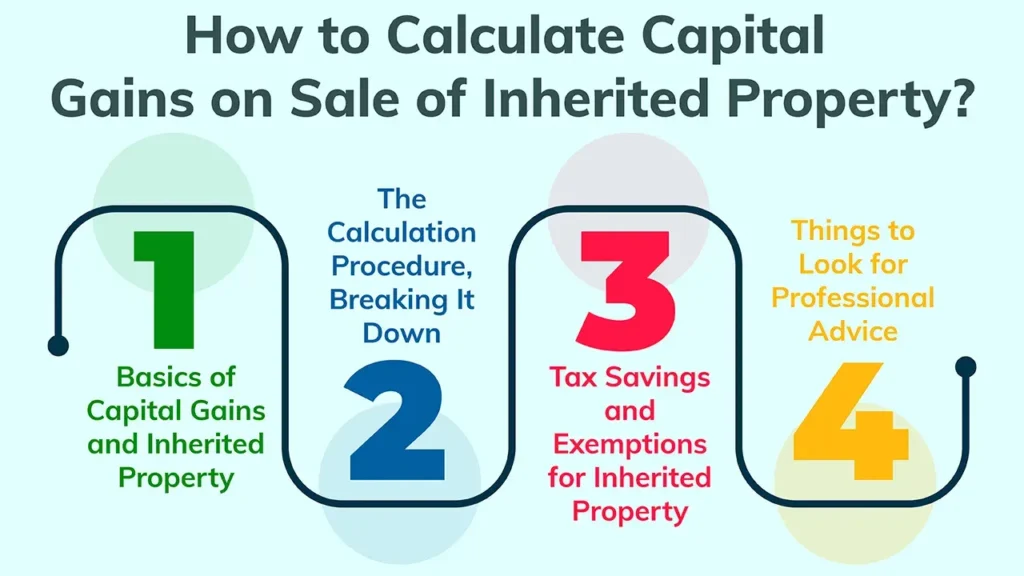Receiving property as an inheritance can be a large financial boost, but what to do with it afterward is the second question: How to Calculate Capital Gains on Sale of Inherited Property?
In this article, we’ll take you through the various steps on how to calculate capital gains tax on inherited property and explain some key terms such as cost basis, holding period, and indexation so that you can understand what will be expected of you in terms of tax.

Section 1: Basics of Capital Gains and Inherited Property
What are Capital Gains?
Capital gains are the profit that you make when you sell an asset (such as property) for a value higher than what you paid to acquire it. Although inheritance per se is usually not taxed upon receipt in many jurisdictions, the disposal of inherited property is nearly always taxed as capital gains.
Core Ideas in the Inheritance and Gift Tax arena
- Cost of Acquisition: This is where it’s all at. For inherited property, it’s typically not what you paid for it (since you didn’t purchase it) but instead:
- Fair Market Value (FMV) at Date of Death: In most jurisdictions, the value of the property is “stepped up” to its fair market value at the decedent’s date of death. This is called the “step-up in basis.”
- Original Purchase Price: In certain jurisdictions, the purchase price for the inheritor is usually the purchase price paid by the owner before, if that can be ascertained.
- FMV as on a Certain Historical Date: The inheritor can have the option to take the Fair Market Value of the property as on an historical date of the previous owner as the cost to the previous owner date incase the property is acquired by the previous owner before a certain date, if it is more beneficial.
- Holding Period: Important to ascertain whether gains are short-term or long-term. In the case of the inherited property, the holding period generally includes the period that the property was held by the decedent.
- Short-term Capital Gains (STCG): This is usually applicable when the property is sold within a short time (say 1 year ). STCG is subject to your normal Income tax slab rates.
- When you sell, you get the following treatment: Long Term Capital Gains (LTCG): If you hold for Long term. Interest income, ATM, STCG and LTCG are usually taxed with lower rates (lower rates plus indexation, in the case of LTCG).
Section 2: The Calculation Procedure: Breaking It Down
Scenario 1: Find Out the “ACPA” For Your App
This is the first Scenario.
Fact Pattern 1: Fair Market Value at Death Nations (Step-up in Basis countries):
- Determine the FMV (e.g., appraisal, real estate appraisal).
- Example: If you paid $100,000forpropertyandFMV at death was $300,000, then your cost basis is $300,000.
Section 2: Previous owner’s purchase cost!
- Source and Paint Show (or “trace”) Original Dead Owner Purchase Price.
- Example: That could be how much you originally paid for the stock, if the original purchase was $50,000.
Step 2: Deduct “Cost of Improvement”
The cost of acquisition includes any capital expenditure for the property, made by either the former owner or by you, that increases the value of the property (example: major renovations, additions).
Step 3: Deduct “Cost of Transfer”
Costs specifically associated with the sale (e.g. sales commissions, legal and professional fees, stamp duty, transfer taxes) are deducted from the sale price.
Step 4: Compute “Net Sale Consideration”
$ \text{Net Sale Consideration} = \text{Selling Price} – \text{Cost of Transfer} $
Step 5: Apply “Indexation Benefit” (for LTCG if applicable)
The cost of acquisition also gets indexed for inflation, and thereby the taxable gain reduces. It applies to long-term capital gains from any country.
Formula (Overall Idea): Here is the last formula at work– Indexed Cost of Acquisition = (Cost of Acquisition / CII (Cost Inflation Index) of acquisition year ) * CII (Cost Inflation Index) of Sale year
Note: Indexation is not available in all countries.
Step 6: How to Calculate Capital Gains (Short-Term vs. Long-Term)
- STCG: Typically added to your total income and taxed at your marginal income tax slab rate.
- LTCG: Often taxed at a lower, fixed rate (e.g., 15% or 20% in various jurisdictions).
- Surcharge and Cess: Additional levies may apply on the calculated tax, depending on local laws.
Step 7: Apply the Relevant Tax Rate
- STCG: Added to your total income and taxed at your marginal income tax slab rate.
- LTCG: Can be taxed at a lower, flat tax rate (e.g., 15% or 20% in different countries).
- Surcharge and Cess Details: Local laws may apply additional surcharge and cess on the calculated tax.
Section 3: Tax Savings and Exemptions for Inherited Property
Reinvestment Exemptions
To encourage homeowners to trade up when they buy another property, many tax codes also provide for exemption from capital gains tax on the profits realized from the sale of a residence, provided a new property is bought within a certain time frame. Typical conditions may be buying within 1-2 years or building within 3 years.
Investment in Specified Bonds
In some countries, the accrual (i.e., change in the value) of the value of the investment is included in the capital gains tax which the seller has to pay upon full cash payment for the sale of such bonds or, in some tax systems.
The gain is taxed only upon the payment or accrual of interest, liquidation, or sale (reward/ capital gains) of bonds. Include at least some typical limits and periods (e.g., Max limit, within 6 months of sale).
Offset for Capital Losses
Capital losses resulting from other assets can often be used to offset capital gains, which lowers the taxable amount. Learn about using capital losses to offset gains from IRS Topic No. 409, Capital Gains and Losses.
Other Deductions
Some costs associated with inheriting or selling the home (like probate fees or legal fees to establish ownership) could be deductible.
Section 4: Things to Look for Professional Advice
Documentation is Key
It is important to keep a record of the following:
- The buying files of the deceased.
- Appraisals (specifically for FMV at death).
- Improvement costs.
- Sale-related expenses.
- Adele’s inheritance paperwork.
Non-Resident Implications
Tax implications may vary for non-residents disposing of inherited property (like TDS implications, DTAA, etc).
When to Get Professional Help
Calculations with inherited property can be complicated, particularly if there are different acquisition dates, improvements, and foreign elements. You are strongly advised to speak to a professional tax advisor to make sure calculations and filing are.
Conclusion: A Smart Approach to Inherited Wealth
To sum up, if you are thinking about how to calculate capital gains on the sale of inherited property, it is important to emphasize the cost price and distinguish between short-term and long-term capital gains.
Solid tax planning for inherited property can make a difference in your financial planning. Don’t let a windfall turn into a tax nightmare – get educated and reach out to the professionals.
Call to Action
Organize your paperwork, and while doing so, work with a tax professional to attempt to unravel the tax implications of a business when you inherit it.
FAQs
1. What is the capital gain on inherited property?
What are capital gains on inherited property? In the simplest of terms, capital gains on inherited property are the profits earned when an inherited property is sold.
2. What is the cost basis of inherited property?
Cost basis is usually the FMV of the property at the date of death of the decedent or the purchase price of the decedent if the purchase date was later than the date of death, which varies by jurisdiction.
3. Are there any tax deductions on the sale of inherited property?
Yes, many jurisdictions provide exemptions for reinvesting the capital gains in another residential property or, under certain conditions, like investing in specified bonds.
How does the holding period affect capital gains tax?
The holding period determines whether the gains are classified as short-term or long-term, which affects the tax rate applied. Long-term capital gains often receive more favorable tax treatment.
Should I consult a tax professional for inherited property sales?
Yes, especially if you have inherited property from multiple countries or complex financial situations. A tax professional can help you navigate the intricacies of capital gains taxation.

Leave a Reply